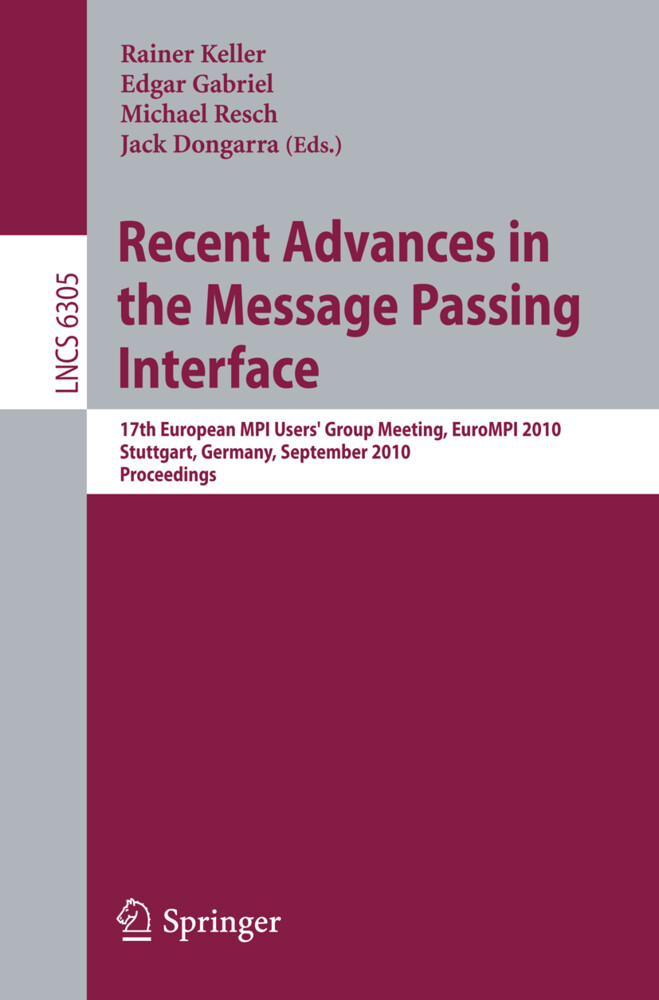
Zustellung: Fr, 22.08. - Do, 28.08.
Versand in 5 Wochen
VersandkostenfreiBestellen & in Filiale abholen:
Parallel Computing is at the verge of a new era. Multi-core processors make parallel computing a fundamental skill required by all computer scientists. At the same time, high-end systems have surpassed the Peta? op barrier, and s- ni? cant e? orts are devoted to the development of hardware and software te- nologies for the next-generation Exascale systems. To reach this next stage, processor architectures, high-speed interconnects and programming models will go through dramatic changes. The Message Passing Interface (MPI) has been the most widespread programming model for parallel systems of today. A key questions of upcoming Exascale systems is whether and how MPI has to evolve inordertomeettheperformanceandproductivitydemandsofExascalesystems. EuroMPI is the successor of the EuroPVM/MPI series, a ? agship conf- ence for this community, established as the premier international forum for - searchers, usersandvendorsto presenttheir latestadvancesinMPIandmessage th passingsystemingeneral. The17 EuropeanMPIusersgroupmeetingwasheld in Stuttgart during September 12-15, 2010. The conferencewasorganizedbythe High Performance Computing Center Stuttgart at the University of Stuttgart. ThepreviousconferenceswereheldinEspoo(2009), Dublin(2008), Paris(2007), Bonn(2006), Sorrento(2005), Budapest(2004), Venice(2003), Linz(2002), S- torini (2001), Balatonfured (2000), Barcelona (1999), Liverpool (1998), Krakow (1997), Munich (1996), Lyon (1995) and Rome (1994). The main topics of the conference were message-passing systems especially MPI, performance, scalability and reliability issues on very large scale systems.
Inhaltsverzeichnis
Large Scale Systems. - A Scalable MPI_Comm_split Algorithm for Exascale Computing. - Enabling Concurrent Multithreaded MPI Communication on Multicore Petascale Systems. - Toward Performance Models of MPI Implementations for Understanding Application Scaling Issues. - PMI: A Scalable Parallel Process-Management Interface for Extreme-Scale Systems. - Run-Time Analysis and Instrumentation for Communication Overlap Potential. - Efficient MPI Support for Advanced Hybrid Programming Models. - Parallel Filesystems and I/O. - An HDF5 MPI Virtual File Driver for Parallel In-situ Post-processing. - Automated Tracing of I/O Stack. - MPI Datatype Marshalling: A Case Study in Datatype Equivalence. - Collective Operations. - Design of Kernel-Level Asynchronous Collective Communication. - Network Offloaded Hierarchical Collectives Using ConnectX-2 s CORE-Direct Capabilities. - An In-Place Algorithm for Irregular All-to-All Communication with Limited Memory. - Applications. - Massively Parallel Finite Element Programming. - Parallel Zero-Copy Algorithms for Fast Fourier Transform and Conjugate Gradient Using MPI Datatypes. - Parallel Chaining Algorithms. - MPI Internals (I). - Precise Dynamic Analysis for Slack Elasticity: Adding Buffering without Adding Bugs. - Implementing MPI on Windows: Comparison with Common Approaches on Unix. - Compact and Efficient Implementation of the MPI Group Operations. - Characteristics of the Unexpected Message Queue of MPI Applications. - Fault Tolerance. - Dodging the Cost of Unavoidable Memory Copies in Message Logging Protocols. - Communication Target Selection for Replicated MPI Processes. - Transparent Redundant Computing with MPI. - Checkpoint/Restart-Enabled Parallel Debugging. - Best Paper Awards. - Load Balancing for Regular Meshes on SMPs with MPI. - Adaptive MPIMultirail Tuning for Non-uniform Input/Output Access. - Using Triggered Operations to Offload Collective Communication Operations. - MPI Internals (II). - Second-Order Algorithmic Differentiation by Source Transformation of MPI Code. - Locality and Topology Aware Intra-node Communication among Multicore CPUs. - Transparent Neutral Element Elimination in MPI Reduction Operations. - Poster Abstracts. - Use Case Evaluation of the Proposed MPIT Configuration and Performance Interface. - Two Algorithms of Irregular Scatter/Gather Operations for Heterogeneous Platforms. - Measuring Execution Times of Collective Communications in an Empirical Optimization Framework. - Dynamic Verification of Hybrid Programs. - Challenges and Issues of Supporting Task Parallelism in MPI.
Produktdetails
Erscheinungsdatum
02. September 2010
Sprache
englisch
Seitenanzahl
308
Reihe
Programming and Software Engineering
Herausgegeben von
Rainer Keller, Edgar Gabriel, Jack Dongarra
Verlag/Hersteller
Produktart
kartoniert
Abbildungen
XIV, 308 p. 120 illus.
Gewicht
492 g
ISBN
9783642156458
Entdecken Sie mehr
Bewertungen
0 Bewertungen
Es wurden noch keine Bewertungen abgegeben. Schreiben Sie die erste Bewertung zu "Recent Advances in the Message Passing Interface" und helfen Sie damit anderen bei der Kaufentscheidung.









